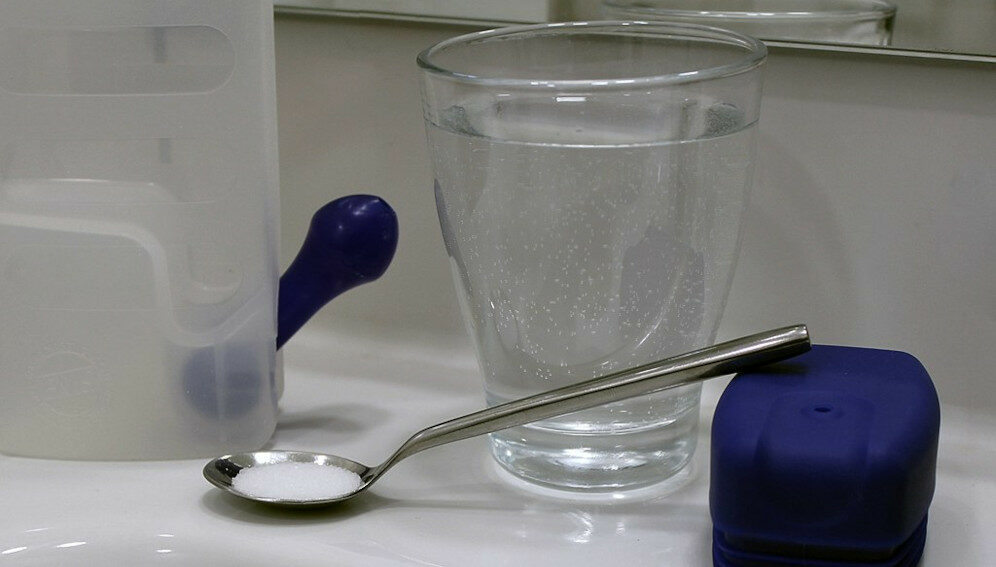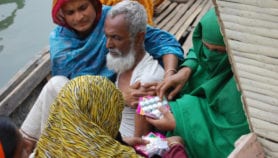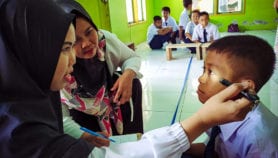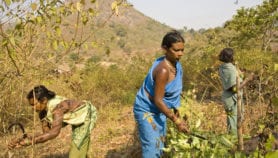30/09/22
Simple nasal wash ‘reduces COVID-19 severity’

By: Sanjeet Bagcchi
Send to a friend
The details you provide on this page will not be used to send unsolicited email, and will not be sold to a 3rd party. See privacy policy.
[NEW DELHI] Simple nasal washes with mild saline water can prevent hospitalisation and deaths from COVID-19, if applied twice daily following a positive diagnosis, according to research led by the US-based Augusta University.
Reducing the amount of virus entering the body cuts the severity of the disease, says the study published September in the Ear, Nose & Throat Journal. It found that nasal washes conducted within 24 hours of diagnosis can prevent the virus from entering the lungs and possibly causing permanent or fatal damage to patients.
Amy Baxter, corresponding author of the study affiliated with the department of emergency medicine at Augusta University, says that extra hydration of the sinuses makes them function better. “If you have a contaminant, the more you flush it out, the better you are able to get rid of dirt, viruses and anything else,” she explained.
“If you have a contaminant, the more you flush it out, the better you are able to get rid of dirt, viruses and anything else”
Amy Baxter, Augusta University
ACE2 receptors in cells — which bind to the spike protein of the virus resulting in COVID-19 infection — are plentiful in the nasal cavity, lungs and mouth and a nasal saline wash can help prevent the virus from attaching to receptors, they said.
The researchers say nasal washes are inexpensive and safe and can be administered at home using half a teaspoon each of salt and baking soda in a cup of boiled or distilled water.
“In areas remote to healthcare, this simple intervention can reduce the likelihood of severe disease,” said Baxter.
The research involved comparing data from high-risk COVID-19 patients, such as those with obesity, hypertension or diabetes and aged over 55, who had carried out nasal washes, with datasets of 3 million COVID-19 cases from the US Centers for Disease Control and Prevention (CDC).
The researchers found that only 1.3 per cent of COVID-19 patients who underwent nasal wash required hospitalisation, suggesting that they were more than eight times less likely to be hospitalised compared with the 11 per cent in the CDC dataset.
According to the US-based University of Wisconsin-Madison, for conditions like acute and chronic sinusitis, common cold, and allergic rhinitis, nasal irrigation can be advocated for rinsing the nasal cavity. The practice of nasal irrigation likely originated in India’s Ayurvedic medical tradition called ‘jala-neti’, said a paper by the university’s department of family medicine and community health.
“Having lived in Thailand, I know that nasal rinsing was a common hygiene practice in Thailand, Vietnam and Laos where they had lower case fatality than the US,” Baxter said.
Kyle Schwartz, co-author of the study affiliated with Edinburgh Napier University, in Scotland, tells SciDev.Net that South-East Asian countries had “a few cultural practices which might have given them an advantage” in dealing with the COVID-19 outbreak.
“Masking was also relatively normalised even at the start of the pandemic and local greeting practices involved bowing rather than shaking hands,” Schwartz said. “We think that what really gave countries like Thailand, Vietnam, and Laos the edge compared to other parts of Asia, was the very widespread use of nasal irrigation.”
Shantanu Panja, eye-nose-throat and head and neck surgeon at Apollo Multispecialty Hospitals in Kolkata, India, who was not involved in the study, believes that the findings can be “easily implemented without adding extra cost to the patient”.
“Jala-neti has been a part of Indian yoga practices for thousands of years. So, it is nothing new to the Indian subcontinent,” Panja said.
This piece was produced by SciDev.Net’s Asia & Pacific desk.















